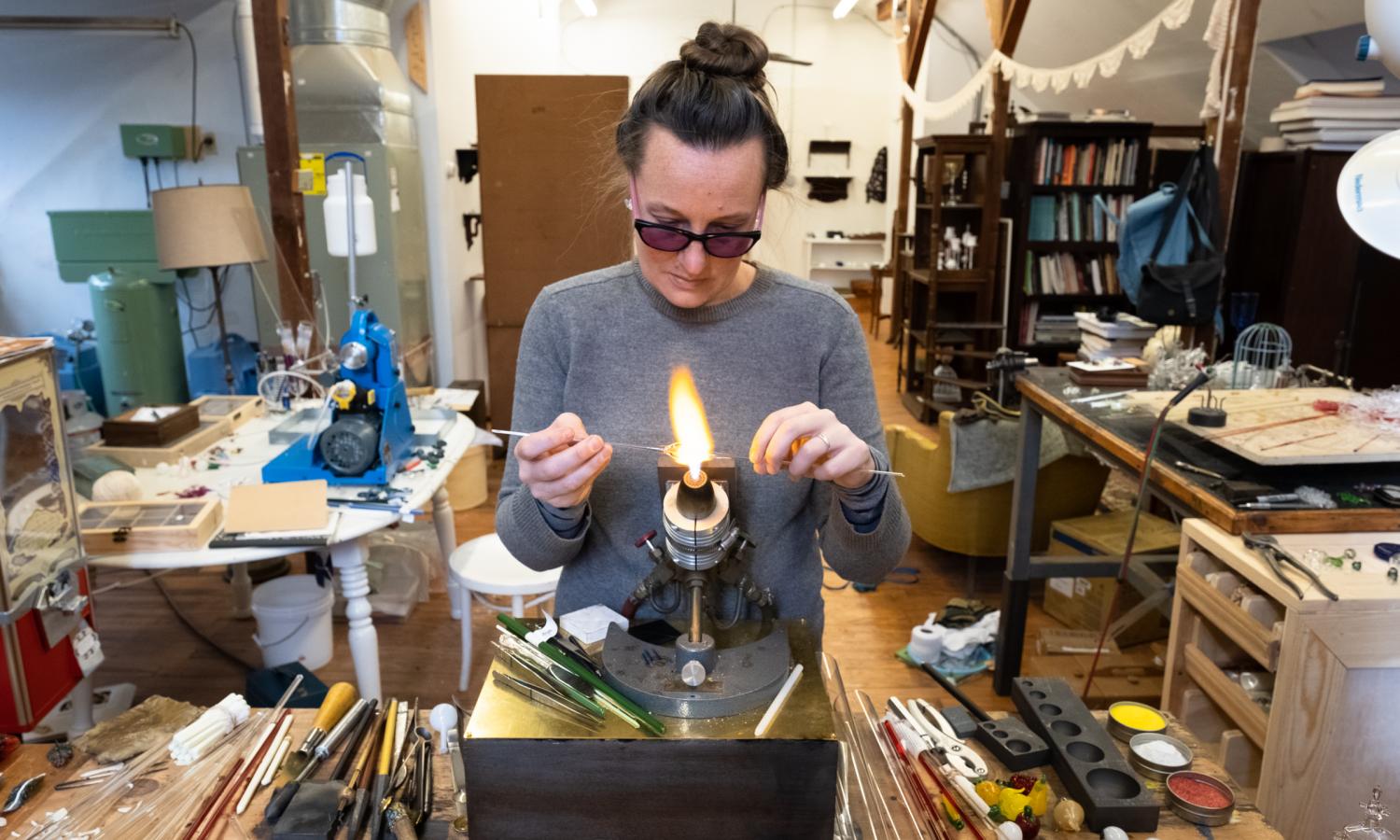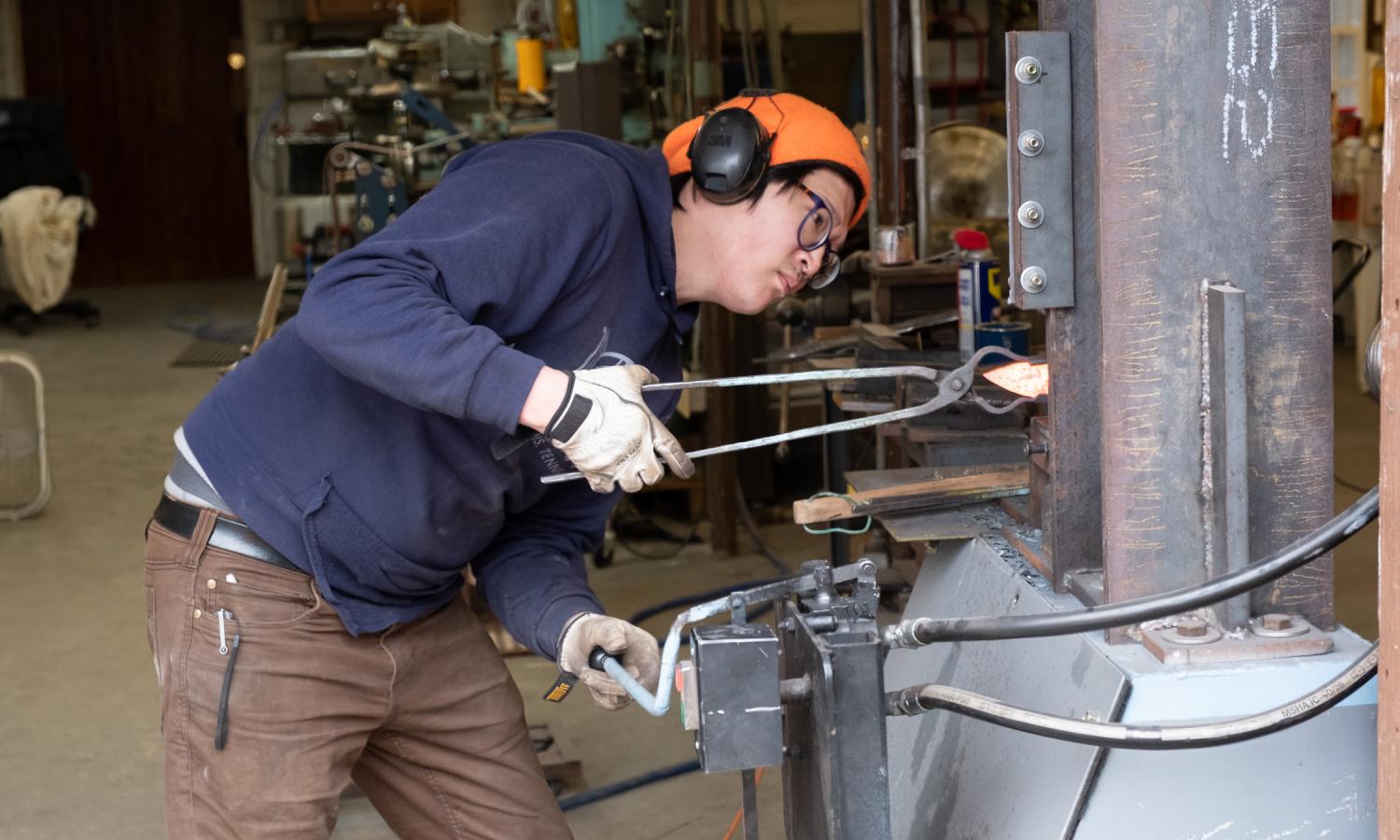Penland Resident Artist Program
Penland’s Resident Artist Program, established in the 1960s, is one of the longest running residencies in the US. The program is designed for professional craft artists who are at a pivotal moment in their creative practice or career—the residency is an opportunity for them to pursue objectives that will have a lasting effect on their work and their lives. Depending on the nature of an applicant’s goals, we now offer two options for interested candidates.
- 1-year project based residency; artists submit a project proposal and may use the time to push technical and conceptual boundaries, to conduct research and development in a particular topic or process, or to explore an entirely new aspect of their work.
- 3-year career transition residency; artists submit objectives to advance their studio practice, to work out the practicalities of making a living, or to make a formative transition in their career path.
PO Box 37
Penland, NC 28765
United States
Residency Program Information
Residency Program Summary
Application Information
We encourage self-motivated, focused individuals working in traditional and nontraditional studio crafts to apply for a residency. No prior connection to the school is required to apply. Penland celebrates varied ideas, world views, and personal characteristics, and is committed to being an organization that welcomes and respects everyone regardless of age, ability, ethnicity, race, religion, philosophical or political beliefs, sexual orientation, gender identity or expression, nationality, geographic origin, and socioeconomic status.
Applications are reviewed by a national committee of artist peers, curators, educators, and other arts professionals who are knowledgeable about material-based work and the craft field in general and/or understand what it takes to be successful in a self-directed residency. Panelists rotate frequently to bring a range of new perspectives to the application process, and creating a diverse group of residents is one of the stated goals of selection.
Applications are evaluated using the following criteria:
- We factor equity and diversity into all of our decision making.
- Portfolios are scored in these three areas: innovation, intention, and skill.
- Applications must present a clear, compelling proposal for a 1-year project or 3-year objectives that can be well supported, informed, and inspired by a residency at Penland.
- CVs are reviewed to determine if a candidate is actively engaged in professional artistic practices.
- The particular qualities of the available studios and a balance of media will also be a factor.
All media taught at Penland are considered appropriate for the Resident Artist Program: books, clay, drawing/painting, glass, letterpress, iron, metals, papermaking, photography, printmaking, textiles, wood. Most resident studios are not media specific; however, the particular qualities of the available studios and the balance of media represented by the current group of resident artists sometimes limits each year’s openings to a range of media.
The experience of living at Penland is shaped in many ways by its rural location, its mountainous terrain, and by the age and nature of the facility. A successful residency depends in part on expectations consistent with what Penland has to offer.
There is no cost to residents for housing, studio space, or utilities.
Artists are responsible for providing tools and equipment vital to their daily studio practices; resident artist studios are simply raw studio spaces.
Artists are responsible for travel expenses to and from Penland
Accessibility
The Penland campus is located on uneven, hilly terrain that poses accessibility challenges. The following studios are wheelchair accessible: books, clay, drawing and painting, glass, iron, letterpress and printmaking, lower metals, photography, papermaking, and wood. The upper metals studio and both textiles studios have stairs that limit access; both are made partially accessible by stair lifts that will lift a person but not a wheelchair or other mobility aids.
Housing that meets ADA standards is available in Arbor House and in some units in The Roost, Dorm 54, Radcliffe, and the Sleeping Cabins. Accessible parking is found at the dining hall and at all studios. Several golf carts are available for use on campus.
While we do our best to accommodate all students, we know that our campus is not accessible for everyone. We are happy to talk with you about what our campus can or cannot do in this regard. Please contact our registrar to discuss in more depth how we can help you come to Penland: 828-765-2359, ext. 1306 or registrar@penland.org. And please know that improved access is part of our long-range campus planning.
We are working on adding more detailed accessibility information to this page. Please check back.
Housing & Accomodation
Studio & Facilities
The Resident Artist studios are clustered in and around a converted historic dairy barn and are located about half a mile down the road (a five minute walk) from Penland’s main campus. All studios have an open floor plan with one or two smaller areas for storage or dedicated use. Each studio is unique and each has its own idiosyncratic features in keeping with the age of the building and the fact that it wasn’t originally designed to be artists’ studios. Five of the studios are on the ground floor and have concrete floors; two of the studios are only accessible by stairs and have wood floors; each studio has a utility sink and access to a shared restroom. The average studio size is about 800 square feet. Each artist enjoys 24-hour access to their private studio.
Residents are responsible for outfitting their studios with equipment and tools relevant to their daily studio practice. Studios are not furnished, and each new resident will find a blank slate when they arrive. One-year residents must bring the tools and equipment they need to pursue their proposed project. Three-year residents bring everything they need to produce work and usually spend the first several weeks of their residencies setting up their studios before they begin to produce work. Our staff works closely with each new resident artist to make sure their studio meets basic needs in terms of utilities and safety; staff can also provide support for installing specialized or heavy equipment, accepting freight deliveries, and troubleshooting electrical or ventilation needs.



